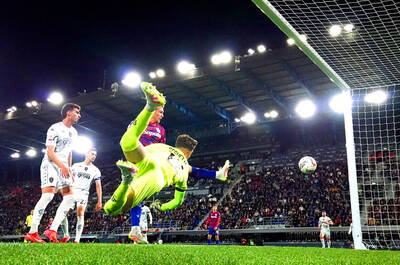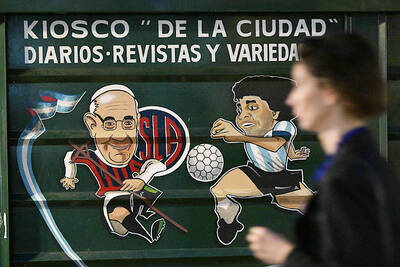Nobody said it to his face, but when All India Football Federation (AIFF) president Praful Patel said last week India’s goal was to qualify for the 2022 World Cup finals in Qatar, his sunny optimism bordered on grim absurdity.
With FIFA secretary general Jerome Valcke sitting next to him, the AIFF chief announced it minutes before signing a 10-year agreement with soccer’s governing body to develop the game in the world’s second-most populous nation enamored otherwise with cricket.
“Indian football is poised for a big leap after a long period of hibernation,” said Patel, also the Indian Heavy Industries Minister.
“There’s going to be a long time before India truly comes up to the expectations of the football-loving community of the country, but one thing I must say is that we are certainly on the right track,” he added.
The timing of his remarks could not have been worse, coming on the same day India slumped to their lowest place, 169th, in the FIFA rankings.
The sport also remains popular only in certain geographic areas, while the TV appetite is restricted to the English Premier League or Spain’s La Liga.
However, Patel insisted the rankings were not the true reflection of India’s team, who beat a second-string Cameroon team to win a five-nation tournament earlier this month and he remained optimistic FIFA’s support would help develop the game.
Valcke also sounded convinced of soccer’s potential in India.
“You are 1.2 billion people and it’s impossible that 1.2 billion people are just playing cricket. There is definite space for football,” Valcke said.
Lack of infrastructure, a struggling national league, low TV viewership and scant sponsorship mean it is easier said than done, according to a local soccer author.
“I think it was a populist statement,” said Jaydeep Basu, who has authored Stories From Indian Football, an anecdotal history of the game in the country.
“India rank 32nd in Asia and the immediate goal should have been to be among the top 10 in the continent, which would ensure a better draw in international tournaments,” Basu said.
“You have a struggling national league and a pool of less than 90 Indian players to choose your national team from — so much for a country of 1.2 billion! In a vast country like ours, you need 50,000 “C” license coaches, but you have only 2,500. Only 12 of the 32 states have a proper local league,” he added. “If you can solve all these problems and qualify for 2022 World Cup, you [have] got to be a genius.”
He added that the country needed to strengthen the domestic competitions in all the states and improve training for children if it is to repeat the feats of the past.
India won Asian Games gold in 1951 and 1962, and finished runners-up in the 1964 Asian Cup in what is considered the golden era of Indian soccer.
The game is still popular in some areas and a Mohun Bagan against East Bengal derby in the eastern metropolitan city of Kolkata still draws up to 100,000 fans.
Nearly 120,000 fans gave a memorable farewell to Oliver Kahn in the German goalkeeper’s 2008 Bayern Munich swansong in Kolkata and Argentina great Diego Maradona brought the city to a standstill during his visit in the same year.
Valcke promised FIFA would do whatever it could to help the country, which is also bidding to host the 2017 Under-17 World Cup, tap into that potential audience and player pool.
“We in FIFA believe that if there is one country in Asia we have to focus, it’s India,” Valcke said.
“The best way to promote India would definitely be to organize the under-17 tournament ... We will work with AIFF to make sure you have the structure to become a player at the highest level,” he added.
“We are not coming to India because we think that in 10 years’ time our money will come from India. We are not looking for return on investment,” Valcke said, promising to consider AIFF’s request for 12 more artificial pitches in addition to the eight already allotted.
Basu said AIFF must make the most of the FIFA investment.
“We missed the bus in the 1970s and cannot afford to err again. FIFA has indeed gone out of its way to help India and AIFF needs to make the most of it,” he said.
Even then, he felt India would fall well short of the 2022 World Cup target.
“AIFF is day-dreaming,” Basu said.

Bologna on Thursday advanced past Empoli to reach their first Coppa Italia final in more than half a century. Thijs Dallinga’s 87th-minute header earned Bologna a 2-1 win and his side advanced 5-1 on aggregate. Giovanni Fabbian opened the scoring for Bologna with a header seven minutes in. Then Viktor Kovalenko equalized for Empoli in the 30th minute by turning in a rebound to finish off a counterattack. Bologna won the first leg 3-0. In the May 14 final in Rome, Bologna are to face AC Milan, who eliminated city rivals Inter 4-1 on aggregate following a 3-0 win on Wednesday. Bologna last reached the

If the Wild finally break through and win their first playoff series in a decade, Minnesota’s top line likely will be the reason. They were all over the Golden Knights through the first two games of their NHL Western Conference quarter-finals series, which was 1-1 going back to Minnesota for Game 3 today. The Wild tied the series with a 5-2 win on Tuesday. Matt Boldy had three goals and an assist in the first two games, while Kirill Kaprizov produced two goals and three assists. Joel Eriksson Ek, who centers the line, has yet to get on the scoresheet. “I think the biggest

From a commemorative jersey to a stadium in his name, Argentine soccer organizers are planning a slew of tributes to their late “Captain” Pope Francis, eulogized as the ultimate team player. Tributes to the Argentine pontiff, a lifelong lover of the game, who died on Monday at the age of 88, have been peppered with soccer metaphors in his homeland. “Francisco. What a player,” the Argentine Football Federation (AFA) said, describing the first pope from Latin America and the southern hemisphere as a generational talent who “never hogged the ball” and who showed the world “the importance of having an Argentine captain,

Noelvi Marte on Sunday had seven RBIs and hit his first career grand slam with a drive off infielder Jorge Mateo, while Austin Wynn had a career-high six RBIs as the Cincinnati Reds scored their most runs in 26 years in a 24-2 rout of the Baltimore Orioles. Marte finished with five hits, including his eighth-inning homer off Mateo. Wynn hit a three-run homer in the ninth off catcher Gary Sanchez. Cincinnati scored its most runs since a 24-12 win against the Colorado Rockies on May 19, 1999, and finished with 25 hits. Baltimore allowed its most runs since a 30-3 loss to